Related Research Articles

Malawi, officially the Republic of Malawi, is a landlocked country in Southeastern Africa that was formerly known as Nyasaland. It is bordered by Zambia to the west, Tanzania to the north and northeast, and Mozambique to the east, south and southwest. Malawi spans over 118,484 km2 (45,747 sq mi) and has an estimated population of 19,431,566. Malawi's capital is Lilongwe. Its second-largest is Blantyre, its third-largest is Mzuzu and its fourth-largest is its former capital, Zomba. The name Malawi comes from the Maravi, an old name for the Chewa people who inhabit the area. The country is nicknamed "The Warm Heart of Africa" because of the friendliness of its people.

A pride parade is an outdoor event celebrating lesbian, gay, bisexual, transgender, and queer (LGBTQ) social and self-acceptance, achievements, legal rights, and pride. The events sometimes also serve as demonstrations for legal rights such as same-sex marriage. Pride events occur in many urban areas in the United States, Canada, Brazil, Mexico, the United Kingdom, Japan, South Korea and Australia. Most occur annually while some take place every June to commemorate the 1969 Stonewall riots in New York City, a pivotal moment in modern LGBTQ social movements. The parades seek to create community and honor the history of the movement. In 1970, pride and protest marches were held in Chicago, Los Angeles, New York City, and San Francisco around the first anniversary of Stonewall. The events became annual and grew internationally. In 2019, New York and the world celebrated the largest international Pride celebration in history: Stonewall 50 - WorldPride NYC 2019, produced by Heritage of Pride commemorating the 50th anniversary of the Stonewall Riots, with five million attending in Manhattan alone. The most recent New York pride event was NYC Pride March 2022, which occurred on June 26, 2022.

Rights affecting lesbian, gay, bisexual, and transgender (LGBT) people vary greatly by country or jurisdiction—encompassing everything from the legal recognition of same-sex marriage to the death penalty for homosexuality.
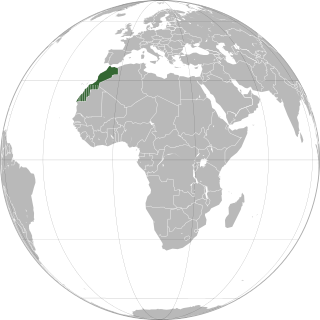
Lesbian, gay, bisexual and transgender (LGBT) people in Morocco face legal challenges not experienced by non-LGBT residents. Both male and female same-sex sexual activity is illegal in Morocco. Moroccans of the LGBT community face a lot of hardships in the country with limited legal rights.
LGBT History Month is an annual month-long observance of lesbian, gay, bisexual and transgender history, and the history of the gay rights and related civil rights movements. It was founded in 1994 by Missouri high-school history teacher Rodney Wilson. LGBT History Month provides role models, builds community, and represents a civil rights statement about the contributions of the LGBTQ+ community. As of 2022, LGBT History Month is a month-long celebration that is specific to Australia, Canada, Cuba, Finland, Germany, Hungary, Italy, United Kingdom and the US.

Lesbian, gay, bisexual and transgender (LGBT) people in South Africa enjoy the same rights as non-LGBT people. South Africa has a complex and diverse history regarding the human rights of LGBT people. The legal and social status of between 400,000–over 2 million lesbian, gay, bisexual, transgender and intersex South Africans has been influenced by a combination of traditional South African morals, colonialism, and the lingering effects of apartheid and the human rights movement that contributed to its abolition.

Lesbian, gay, bisexual and transgender (LGBT) rights in Australia have advanced over the latter half of the twentieth century and early twenty-first century to make Australia one of the most LGBT-accepting countries in the world, with opinion polls and the Australian Marriage Law Postal Survey indicating widespread popular support for same-sex marriage. A 2013 Pew Research poll found that 79% of Australians agreed that homosexuality should be accepted by society, making it the fifth-most supportive country surveyed in the world. With its long history of LGBT activism and annual Gay and Lesbian Mardi Gras festival, Sydney has been named one of the most gay-friendly cities in the world.

Lesbian, gay, bisexual, and transgender (LGBT) people in the Syrian Arab Republic face legal challenges not experienced by non-LGBT residents. Article 520 of the penal code of 1949, prohibits "carnal relations against the order of nature", and provides for up to three years' imprisonment.

Lesbian, gay, bisexual, and transgender (LGBT) persons in Botswana face legal issues not experienced by non-LGBT citizens. Both female and male same-sex sexual acts have been legal in Botswana since 11 June 2019 after a unanimous ruling by the High Court of Botswana. Despite an appeal by the government, the ruling was upheld by the Botswana Court of Appeal on 29 November 2021.
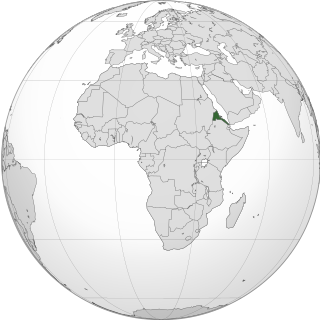
Lesbian, gay, bisexual, and transgender (LGBT) persons in Eritrea face legal challenges not experienced by non-LGBT citizens. Homosexual acts are illegal in Eritrea, punishable by up to three years in prison. LGBT persons are regularly prosecuted by the government and additionally face stigmatization among the broader population.
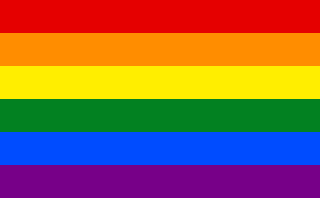
The rainbow flag, also known as the (gay) pride flag, is a symbol of lesbian, gay, bisexual, and transgender (LGBT) pride and LGBT social movements. The colors reflect the diversity of the LGBT community and the spectrum of human sexuality and gender. Using a rainbow flag as a symbol of gay pride began in San Francisco, California, but eventually became common at LGBT rights events worldwide.

Lesbian, gay, bisexual, and transgender (LGBT) persons in Malawi face legal challenges not experienced by non-LGBT residents.

Lesbian, gay, bisexual, and transgender (LGBT) people in Somalia face legal challenges not experienced by non-LGBT residents. Being LGBT is highly illegal in Somalia; same-sex sexual activity is punishable by up to death in areas controlled by Al-Shabab as well as in Jubaland. LGBT persons are regularly prosecuted by the government and additionally face stigmatization among the broader population.
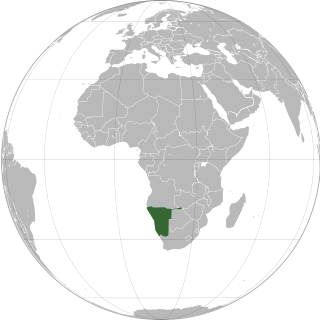
Lesbian, gay, bisexual, and transgender+ (LGBT+) persons in Namibia face legal challenges not experienced by non-LGBT residents. Discrimination based on sexual orientation and gender identity is not banned in Namibia, and households headed by same-sex couples are not eligible for the same legal protections available to opposite-sex couples.

Lesbian, gay, bisexual, and transgender (LGBT) rights in Asia are limited in comparison to the Western world. Same-sex sexual activity is outlawed in at least twenty Asian countries. As of 2022, only Cyprus, Israel and Taiwan provide a wider range of LGBT rights – such as same-sex relationship recognition, while at least nine countries have enacted protections for LGBT people. In Afghanistan, Brunei, Iran, Qatar, Saudi Arabia, the United Arab Emirates and Yemen homosexual activity is punished with the death penalty. In addition, LGBT people also face extrajudicial executions from non-state actors such as the Islamic State of Iraq and the Levant and Hamas in the Gaza Strip. Egalitarian relationships modeled on the Western pattern have become more frequent, though they remain rare.
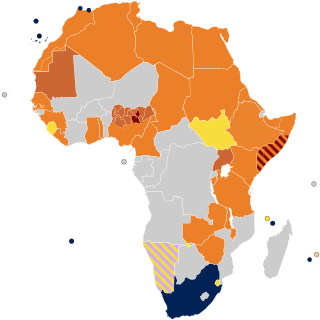
With the exception of South Africa and Cape Verde, lesbian, gay, bisexual, and transgender (LGBT) rights in Africa are limited in comparison to the United States, Canada, Western Europe, Australia, and New Zealand. Out of the 55 states recognised by the United Nations or African Union or both, the International Gay and Lesbian Association stated in 2015 that homosexuality is outlawed in 34 African countries. Human Rights Watch notes that another two countries, Benin and the Central African Republic, do not outlaw homosexuality, but have certain laws which discriminate against homosexual individuals.

The majority of the countries of the Commonwealth of Nations, formerly known as the British Commonwealth, still criminalise sexual acts between consenting adults of the same sex and other forms of sexual orientation, gender identity and expression. Homosexual activity remains a criminal offence in 32 of the 56 sovereign states of the Commonwealth; and legal in only 24.

Steven Lee Anderson is an American preacher and founder of the New Independent Fundamentalist Baptist movement. He is pastor of Faithful Word Baptist Church in Tempe, Arizona. He advocates for the death penalty for homosexuals, and prayed for the deaths of former U.S. president Barack Obama and Caitlyn Jenner. He produced a documentary titled Marching to Zion in which he "championed a wide range of antisemitic stereotypes", according to Matthew H. Brittingham of Emory University.

Anti-gay purges in Chechnya in the Chechen Republic, a part of the Russian Federation, have included forced disappearances—secret abductions, imprisonment, torture—and extrajudicial killing by authorities targeting persons based on their perceived sexual orientation, primarily gay men. At least 2 of the 100 people, whom authorities detained on suspicion of being gay or bisexual, have reportedly died after being held in what human rights groups and eyewitnesses have called concentration camps.
Rainbow Railroad is a Canadian charitable organization that helps lesbian, gay, bisexual, transgender, queer, and intersex (LGBTQI) individuals escape violence and persecution in their home countries. In the past, they have helped individuals from the Caribbean, Central and South America, Eastern Europe, the Middle East and Africa through emergency travel support and other forms of assistance. The organization was formed in 2006, with its name and concept inspired by the Underground Railroad that was used by African-American slaves to escape into free states. Since 2006, Rainbow Railroad has helped over 3100 LGBTQ+ people from around the world find safety. It received charitable status from the Canada Revenue Agency in 2013, and received 501(c)(3) charity organization status in 2015. The organization is based in Toronto and New York City.
References
- 1 2 Washinyira, Tariro (July 29, 2017). "Gay immigrants campaign for acceptance". The Times. South Africa. Retrieved May 15, 2019.
- ↑ Collison, Carl (November 23, 2018). "Cops can't cope with hate crimes". Mail & Guardian.
- ↑ "Ray of Light". Stories on Malawi. November 17, 2007. Retrieved May 16, 2019.
- ↑ "The Gay Refugee Who Helps Others". Boston Gay Men's Choir. November 16, 2017. Retrieved May 16, 2019.